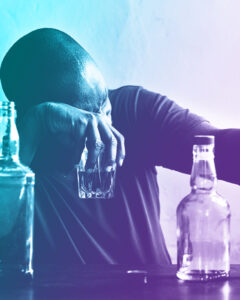Alcohol Dehydration
We have all been there. Maybe you started drinking in your teen and college years, becoming the life of the party after a few shots of liquor. Or maybe you waited to start until after you graduated with your degree, finally letting loose after years of hard work. Even the man who never drank in his life who decided to turn to alcohol after losing his job of 20 years. What do they all have in common? Chances are, they all have experienced a hangover at some point in time. What causes hangovers anyway?

In 2019, 24.5% of adults aged 18-44 participated in binge or heavy drinking in Hillsborough County. This is almost a full 3% higher than the state of Florida. Here at Clean Recovery Centers, we understand college parties and social gatherings can be a great way to let loose after a long week. For those who find alcohol is taking over their life outside the party scene, we are here to help. Our unique three-phase approach to addiction treatment is the only one of its kind. We can adjust the treatment path to fit the various needs of our clients. In our blogs, we provide education and resources to our Suncoast communities. Today, we take a look at what causes alcohol dehydration.
How Does Alcohol Affect Hydration?
Alcohol affects hydration by suppressing the release of vasopressin. Vasopressin is the hormone in the brain that signals the kidneys to retain fluid. When alcohol is consumed, it increases urination, and therefore, loss of fluids. As alcohol consumption continues, the body will become more dehydrated. This is where hangovers come in, and the main reason for the symptoms behind them is dehydration. Common signs include headaches, increased thirst, and fatigue.
Dehydration can range from mild to severe. For those partaking in binge drinking, the likelihood of life-threatening dehydration increases. Alcohol poisoning is when the body becomes overwhelmed by the amount of alcohol within the system. While many know the signs of alcohol poisoning – such as vomiting and passing out – the cause behind it is actually the result of severe dehydration. This is why it is imperative to seek medical attention if alcohol poisoning is suspected, as medical professionals will provide life-saving fluids.
The Signs of Alcohol-Induced Dehydration
When you are drinking, there are signs your body is giving to let you know dehydration is happening. Alcohol is a diuretic, meaning it tells the body to produce more urine. Remember the phrase “breaking the seal?” This comes from the frequent urination that happens while drinking alcohol. The phrase often refers to the first urination while drinking, as after that happens the person seems to have to go every few minutes. What is happening is that the body is expelling all fluids, leading to alcohol-induced dehydration.
Alcohol-induced dehydration is also an aspect of a hangover. The most common symptoms of dehydration are lightheadedness or pounding headaches, increased thirst and water consumption, and fatigue. Because dehydration leads to electrolyte imbalance, muscle cramps and spasms can occur.
Preventing Alcohol-Induced Dehydration
There are steps that can be taken to avoid alcohol-induced dehydration. These include:
Eat before drinking: This slows the amount of alcohol entering the bloodstream at one time. It gives the liver more time to process and filter out the alcohol.
Pace yourself: Binge drinking is a surefire way to become dehydrated – and fast! Enjoying one drink at a time over an extended period will help the liver keep up with detoxifying.
Drink water: Adding a glass of water between drinks will help replenish hydration. Also, drink more water throughout the day if you know you are going to be drinking later.
The key to preventing alcohol-induced dehydration is to only drink in moderation, or not at all.
Getting a Hangover
Hangovers are the worst, but they are the body’s way of telling you that you need to heal and rehydrate. While dehydration is the cause of headaches and thirst, alcohol also affects other parts of the body and contributes to hangover symptoms. It may seem easier to fall asleep after drinking, but alcohol disturbs sleep patterns, making it less restful and not allowing proper restoration. Alcohol is also absorbed by the stomach lining, and causes acid production to increase. This is what contributes to nausea and vomiting during a hangover.
When a hangover is present, the body is technically going through an early stage of withdrawal. Whether you only drank that one night or are in the stages of alcoholism, the brain was adjusting to the alcohol you were drinking. When the alcohol is processed, the brain attempts to restore balance, which can lead to increased anxiety and stress after a night out.
For those living with high-functioning alcoholism, spotting a hangover may be more difficult. This is because the person is already accustomed to how their body reacts when they drink. If you suspect a loved one is a high-functioning alcoholic, you may see some signs that seem normal but are actually their way of treating the hangover:
- They take ibuprofen each morning
- They seem more thirsty than normal or are constantly drinking water
- They may sneak a drink to alleviate withdrawal symptoms
- They may be going to the bathroom more than usual
- They seem extra anxious or irritated
Can You Cure a Hangover?
The answer is no, there is no way to just “get rid” of a hangover. The body is in recovery mode after a night of heavy drinking, and the only way it will feel better is with time. Some other methods of helping a hangover include hydrating, light exercise, rest, eating a healthy meal, and taking an over-the-counter pain medication. It is important to note that medications can cause side effects that make the hangover worse, and possibly dangerous. Acetaminophen affects the liver, which is already working in overdrive due to alcohol consumption. This can cause toxicity and lead to complications that involve medical attention. Nonsteroidal anti-inflammatory drugs (NSAIDs) such as ibuprofen are a safer choice, but can cause or increase nausea.
Old wives’ tales are never a way to cure a hangover. Drinking caffeine – such as coffee – will further dehydrate the body, making the hangover worse. A cold shower may help you feel motivated, but it does not make all hangover symptoms go away. Finally, having a drink in the morning to stop withdrawal symptoms is only a temporary fix, the body will still need hydrating fluids such as water or an electrolyte drink to fully recover.
Getting Treatment for Alcoholism in Tampa, FL
 When you wake up day after day with headaches, nausea, and all-around fatigue, life can feel like an endless blur of bleakness. It’s okay to admit that alcohol is draining you, and the next step is to seek help. Many have found themselves at the mercy of alcohol, hangovers, and withdrawal symptoms, but they have been able to find recovery from alcoholism. There is nothing in your way stopping you from achieving the same goal of living alcohol-free.
When you wake up day after day with headaches, nausea, and all-around fatigue, life can feel like an endless blur of bleakness. It’s okay to admit that alcohol is draining you, and the next step is to seek help. Many have found themselves at the mercy of alcohol, hangovers, and withdrawal symptoms, but they have been able to find recovery from alcoholism. There is nothing in your way stopping you from achieving the same goal of living alcohol-free.
If you or someone you love is spending more days hungover than not, it’s time to talk about treatment. Clean Recovery Centers is here to remind you that you are a person, not an alcohol use disorder. With specialized therapies like rapid resolution, our dedicated team helps you understand the root cause of your alcohol use. Together, we work to help you learn healthy coping skills and rediscover your passions. Call us today at (888) 330-2532 to learn more about our treatment options.
FAQs
What are the symptoms of dehydration from alcohol?
The most common symptoms of dehydration from alcohol are headaches, fatigue, and increased thirst.
Does drinking alcohol make you dehydrated?
Yes, alcohol is a diuretic, meaning it increases urine production. This causes the body to excessively flush fluid out, causing dehydration.
How long does it take to rehydrate after drinking?
Rehydration is a relatively quick process, and drinking over 20 ounces of water can rehydrate the body in as little as 45 minutes. However, hangover symptoms can still continue even after rehydration is complete.


